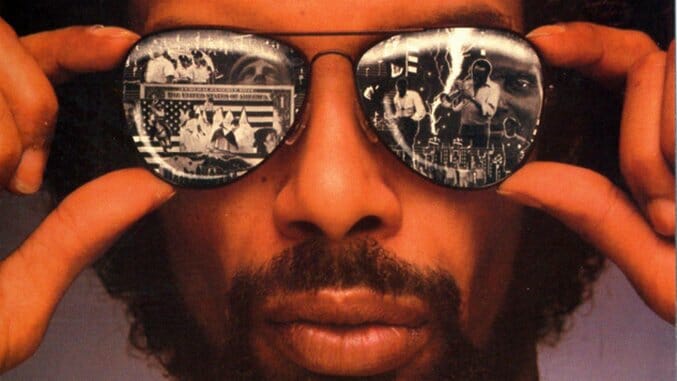20 Songs In The Key Of Black Lives Matter

Take a stand. Stop the violence. These are among the impassioned cries in Black America after last week’s horrific eruption of the U.S. divide over race and policing, resulting in the murders by cops of Alton Sterling, Philando Castile, Delrawn Small, and the high-profile arrest of one of the Black Lives Matter movement’s leaders DeRay McKesson while protesting in Baton Rouge, Louisiana. Old and young, famous and infamous, this land’s people who are darker than blue—or whom true citizenship has always been an ideal never quite attained—keep reeling from the news, pondering if lynching season is open again (per a disturbing incident in Atlanta’s Piedmont Park last Thursday), planning boycotts off social media, and taking their rage and sorrow to the streets nationwide.
When things fall apart in society and we find ourselves angry, sad, hopeless, tired, disempowered, and mired in a ball of confusion, most of us turn to our kin and music for solace. Amongst black folks, songs from the 1960s-70s Golden Age of black music are dominating the Facebook loop as they search for succor and a semblance of peace amidst the suffering, and the cohort of conscious artists are covering and offering up tunes from the same well. And so, here below is a sampling of the sounds we cleave to, hoping that once again music can be a great healer and restore our soul power.
1. “Black Man In A White World,” Michael Kiwanuka
Anglo-African folk singer Kiwanuka teamed with black American digital-soul producer Danger Mouse to bring forth this timely track, an urban blues sitting firmly between this list’s Lamont Dozier selection (see entry No. 10) and Kendrick Lamar. In stark black and white, the song’s video illuminates the peculiar hyper-consciousness and peril of being black males in the West that does not prize them and the resulting constant surveillance and menace by the police. Boldly titling his album after the song, Kiwanuka makes it plain that he’s strong enough to step out of the fey and take up the activist torch of such forebears as Richie Havens and Buffy Sainte-Marie.
2. “Drums,” Peter LaFarge
Although specific to his Native American subjectivity, being a song about the horrible forced assimilation practices of Indian schools, iconic Village folkie LaFarge’s “Drums” is ultimately about oppression and an embattled culture’s will to fight back and liberate itself. The black indigenous communities’ struggle for recognition in Indian Country has also dominated the news in recent years; but Idle No More and native solidarity with Black Lives Matter amongst the youth have also re-knit ties in order to strike back against forces (sprouting like weeds this summer of internecine presidential campaigns) declaring it’s time to Make America White—ahem—Great, Again.
3. “Chameleon,” Labelle
“Chameleon” is Labelle at its Afro-futuristic, space-rock best—one of the crowning jewels of primary songwriter Nona Hendryx’s repertoire. Street corner vocals take flight on lyrics promising a sublime journey from earthbound nature unto a new plane of bliss: “Come with me / (I do believe) / …If you believe in the magical world that we live in…” There are echoes of many Negro spirituals full of avian imagery and determined sojourns on a quest for freedom. “Chameleon,” title cut to Labelle’s 1976 swansong (prior to 2008 slight return), goes “back to chuuch,” ringing down the stratosphere.
4. “Arise and Shine,” Doug Carn
This heroic, hard swinging, vanguard jazz staple from Doug Carn’s Spirit Of The New Land is a clear call-to-arms to black folks on the cosmic tip. Forged in the fires of revolutionary struggle, the sound of Doug and former wife Jean Carn’s work epitomized the Black Arts movement’s aesthetic. Sonifying deliverance from Jim Crow, the Carns, on Spirit Of The New Land, created a soundtrack for rebirth of a nation, spiritual elevation, and total liberation while soothing to the soul. “Arise and Shine” is an anthemic hymn from times when we believed that peace, justice, equality, and parity in societal standing was within reach. As the lyrics go, “Arise and shine / Beautiful people arise / Arise in the light of God’s wisdom / Beautiful people arise!”
5. “I Am the Black Gold Of the Sun,” Rotary Connection
Under the visionary hand of producer-arranger-songwriter-musician Charles Stepney, Rotary Connection is psychedelic soul and orchestral acid rock at its zenith, “I Am the Black Gold Of the Sun” is part of the primer of the post-soul generation of freak-flag flyers and cohort of creatives—the phrase oft-invoked, the song one every musician attempts to master. The band of Chicago Afro-Hippies including a young Minnie Riperton swirls up through the Aether, musing upon the primordial root lines of black being, achievement, and glory. This song’s shading of sentiments through a potent hallucinatory haze provides essential uplift for these days of rage.
-

-

-

-

-

-

-

-

-

-

-

-

-

-

-

-

-

-

-

-

-

-

-

-

-

-

-

-

-

-

-

-

-

-

-

-

-

-

-

-








































